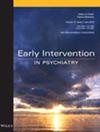Theory of Mind Abilities May Predict Treatment Outcomes in Adolescents With Obsessive-Compulsive Disorder: A Follow-Up Study
Abstract
Aims
Researchers report varying levels of cognitive flexibility and theory of mind (ToM) deficiencies in adolescents with obsessive-compulsive disorder (OCD). This research set out to investigate the impact of these variables on the disorder's outcomes.
Method
The study involved 39 adolescents with OCD and 40 healthy controls. We assessed the case group at the initial visit to the outpatient clinic and again at the end of the first year of treatment. The Children's Yale-Brown Obsessive-Compulsive Scale (CY-BOCS) was applied to assess OCD symptom distribution and severity. The Reading the Mind in the Eyes of Children Test (RME-CT) was applied to evaluate ToM skills, and the Cognitive Flexibility Scale (CFS) was employed to evaluate cognitive flexibility levels.
Results
Baseline RME-CT and CFS scores were significantly lower in adolescents with OCD compared to the control group (p = 0.002 p = 0.001, respectively). At the end of the 1-year follow-up, RME-CT and CFS scores increased significantly in the adolescents with OCD (p < 0.001, p = 0.003, respectively). A significant negative correlation was observed between the initial RME-CT scores and the Y-BOCS scores at the end of the 1-year follow-up (p < 0.001). The initial RME-CT score had a significant negative predictive effect on the subsequent severity of OCD (β = −0.711, p < 0.001).
Conclusions
The research revealed poorer long-term prognoses for OCD in adolescents who exhibit low ToM skills. In conclusion, the results indicate that ToM skills may serve as a predictive factor for long-term treatment outcomes among adolescents diagnosed with OCD.

 求助内容:
求助内容: 应助结果提醒方式:
应助结果提醒方式:


